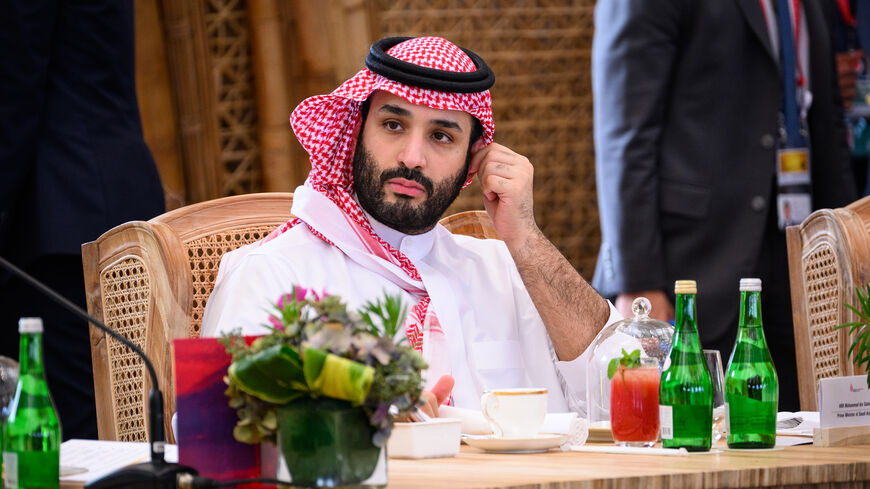WASHINGTON — A flurry of recent reports suggest Israel and Saudi Arabia are slowly inching closer to a once-unthinkable restoration of ties, with Israeli Foreign Minister Eli Cohen telling Al-Monitor last week that the two countries could reach a breakthrough by the end of the year.
Saudi Arabia is expected to announce, possibly as soon as next month, that it will allow Israel’s Muslim citizens to take direct flights to the holy city of Mecca for the hajj pilgrimage that begins in late June.
The Saudi-Israeli unofficial relationship is creeping forward as the Biden administration tries to build on former President Donald Trump's Abraham Accords, which established formal diplomatic relations between Israel and several Arab states, including the United Arab Emirates, Morocco and Bahrain.
The administration recently dispatched national security adviser Jake Sullivan, the White House’s top Middle East official Brett McGurk and energy czar Amos Hochstein to meet with Saudi Crown Prince Mohammed bin Salman (MBS) in Riyadh. From there, McGurk and Hochstein traveled to Jerusalem to brief Prime Minister Benjamin Netanyahu on their discussions with Prince Mohammed.
Sources familiar with the talks said the inclusion of Hochstein, a confidant to the president who sealed the Lebanon-Israel maritime deal, signals Israeli-Saudi normalization is a priority issue for Biden. Israel’s Foreign Ministry Director-General Ronen Levy also discussed a possible Saudi deal with administration officials during his visit to Washington last week. Secretary of State Antony Blinken will likely raise the issue during an expected visit to Saudi Arabia next month.
Axios reports the White House is pushing for an agreement in the next six to seven months before Biden’s reelection campaign gets into full swing. A US official, however, pushed back on the report, telling Al-Monitor that while Israeli-Saudi normalization remains a priority for the administration, there is no such time frame.
Much stands in the way of a potential deal, including the Saudis’ ambitious opening gambit. In exchange for normalization, the kingdom is seeking from Washington NATO-like security guarantees, support developing a civilian nuclear power program and a loosening of restrictions on US arms sales.
Closer defense cooperation would be a hard sell in Congress, where many of Biden’s Democratic allies want to keep Saudi Arabia ostracized for the murder of columnist Jamal Khashoggi, the kingdom’s dire human rights record and its bombing campaign in Yemen.
Biden himself once pledged to make Saudi Arabia a "pariah" over those very issues. Some experts are skeptical that MBS would grant a major foreign policy win to a man who just a year ago refused to shake his hand.
But Richard Goldberg, senior advisor at the Foundation for Defense of Democracies, said it would be a mistake for the Saudis to wait for a change in administration to normalize with Israel.
“There's actually a strong argument to cement those ties under a Democratic president in an environment where Democrats have been more hostile to Saudi Arabia in recent years,” Goldberg said.
Talk of normalization comes at a moment of tension between the Arab world and Netanyahu’s right-wing coalition government, members of which espouse hard-line views against the Palestinians. Just this week, the Saudi Foreign Ministry was forced to issue a statement after ultranationalist Israeli National Security Minister Itamar Ben-Gvir made a provocative visit to Jerusalem's most sensitive holy site.
Saudi Arabia’s King Salman has long championed the 2002 Arab Peace Initiative, which calls for recognition to be offered only in exchange for Palestinian statehood and Israel’s full withdrawal from the Palestinian territories occupied since 1967. MBS reiterated that stance at the Arab League summit in Jeddah last week and said the Palestinians remained “at the top of the kingdom’s priorities.”
The kingdom’s de facto leader is said to be less concerned with the Palestinian issue but conscious of his country’s leadership status in the Islamic world. Analysts say Prince Mohammed might accept a step short of statehood if there are concessions for the Palestinians that would insulate the kingdom from the inevitable blowback.
Normalization “is a question of not if, but when,” said Aaron David Miller, senior fellow at the Carnegie Endowment for International Peace. “MBS has asked for a lot, particularly at a time when his political stock in Washington is very low.”
But injecting new urgency into the normalization bid is Saudi Arabia’s rapprochement with Iran and the perception that China is becoming the region’s new power broker, Miller said.
“The impression that the US has been frozen out of the region gives the administration added incentive," Miller said. “China may have brokered Iran-Saudi Arabia, but only the administration can broker Israel-Saudi Arabia.”
This is an excerpt from Al-Monitor’s newsletter, The Takeaway. Sign up here to get the full newsletter in your inbox every week.







